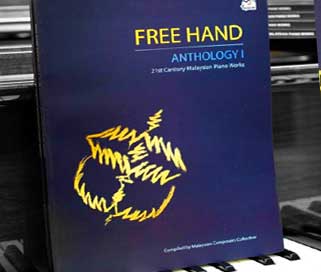And having just completed music to the play 'The Sandpit' at Penang Performing Arts Centre, he is also waist-deep in his second opera The Killing of Meghnad.
The wind octet heard at KLPac's performing space in Taman Tun last September is enigmatically titled 'He too a simulacrum, that another person was dreaming him', a typically zen response from the soft-spoken composer with a penchant for thinking far outside the box into unknown metaphysical spheres, as evident in his earlier works Ittar and Topeng with their contemplation of creation and enlightenment respectively.
Johan explained that the work for pairs of flute, clarinet, oboe and bassoon is based on the line from a short story by Jorge Luis Borges 'The Circular Ruins' that describes how a person may possibly exist as someone else's dream, who in turn is another’s dream in a kind of psychological hall of mirrors.
 "This idea of moving back towards an origin forms the basis of the piece’s concept that illustrates a gradual formation of the local folk tune 'Suriram'. The piece starts with a very diluted variation of the tune, which slowly comes together at the end of the piece. But not its literal tune; a slightly blurred version, hence as in a dream," he explains.
"This idea of moving back towards an origin forms the basis of the piece’s concept that illustrates a gradual formation of the local folk tune 'Suriram'. The piece starts with a very diluted variation of the tune, which slowly comes together at the end of the piece. But not its literal tune; a slightly blurred version, hence as in a dream," he explains.One would be hard pressed to find the folk music easily in the eight-minute meditation as wind textures weave in and out of one another's way in a continuous buildup of sound, until they finally band together for the closing bars intoning a strained chorale.
And in Johan's own zen manner with composition, in a field where composers are wont to control their performers to the minutest details such as precise placing of the instrument's mouthpiece, the Penangite is happy to leave the dynamics and expression completely at the performers' and conductor's discretion.
After months of coaxing the every busy bee who is furiously working on his doctorate thesis, to reveal more about his gestating opera The Killing of Meghnad, Johan finally reveals that it is based on the Ramayana "but with a bit of twist". Exploring how good can also act against ethics and morals, and how evil can sometimes represent the sacred, Johan mused that in his opera, "the binary divide between who is good and who is evil is completely blurred."
The idea for his second opera after his delectable The Conference of the Birds in 2009 was inspired when his regular collaborator librettist William Radice first mentioned the tale of Ravana's son to him. Johan said he was struck by how there is "this great divide between good and evil in the world today", and how he felt people need to "reflect on what good and evil actually means".
Thought-provoking stuff, and I can guarantee it will be well worth the wait for Johan to complete the opera some time around 2015.
- The B-Side March 2014








0 Comments